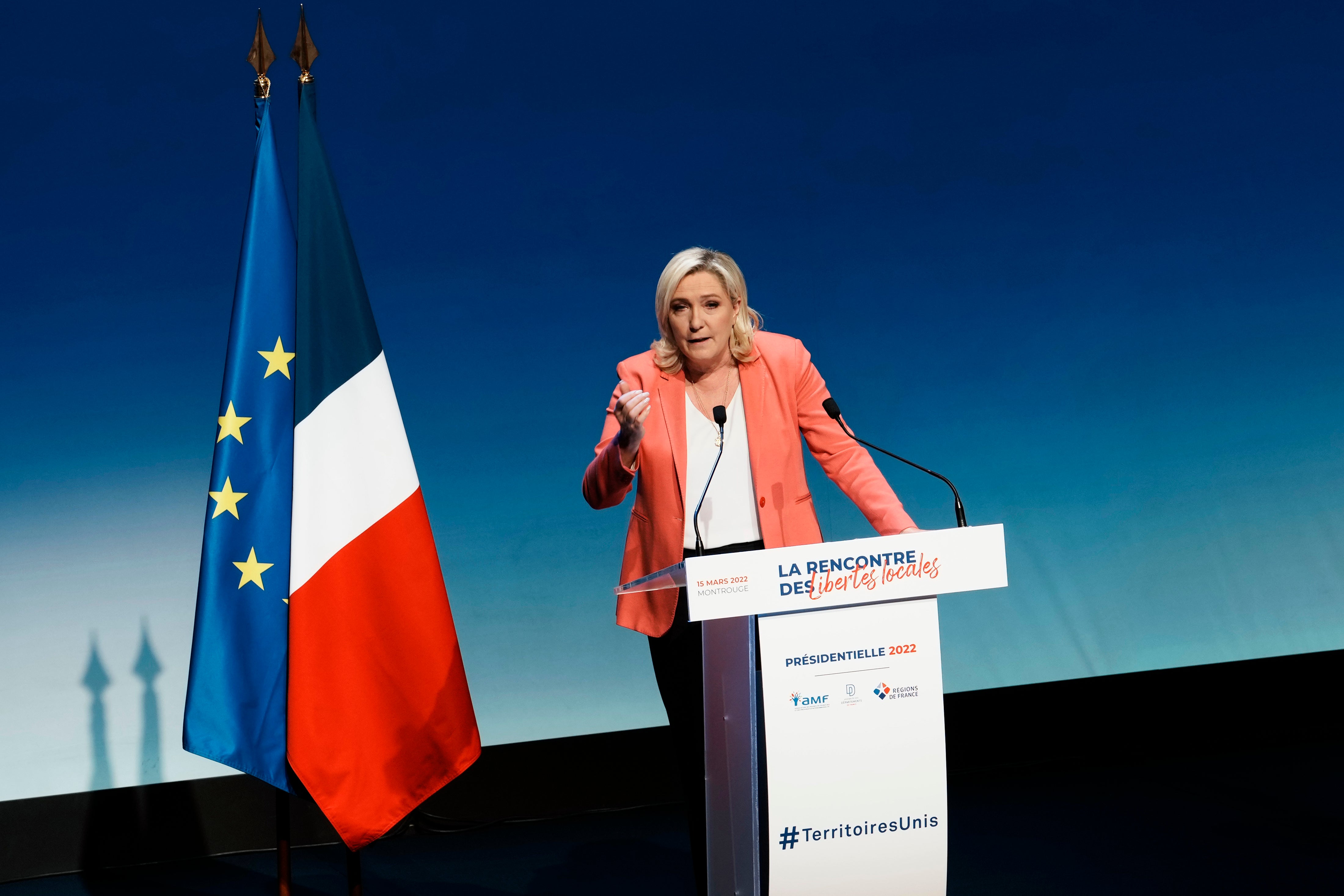The reasons why Le Pen is closing in on Macron in the polls
The French president has been complacent – and he may pay for it at the ballot box, argues Sean O'Grady


For a personal political vehicle with the energising name of “En Marche!”, Emmanuel Macron’s re-election campaign has got off to a late and lethargic start.
So much so that the polls are placing President Macron only a few points ahead of Marine Le Pen, the far right candidate representing Rassemblement National, a rebranded Front National. Macron is rated at about 53 per cent to 47 per cent for Le Pen in the second and final round of the election due on 24 April. The polls for the first, preliminary round of the election this Sunday (10 April) have Macron ahead by about 27 per cent to 22 per cent – far too close for comfort as he prepares for the duel with Le Pen. It is now Le Pen who has the momentum.
Given the standard margin of error, the opinion polls may even leave open the door to a Le Pen victory by the narrowest of margins – a revolution, but also an unstable one because she may well not control parliament (which goes to the polls later in the year) and a tiny majority will erode her legitimacy. It is also worth remembering that Macron beat Le Pen in the run-off in 2017 by gathering 66 per cent of the vote.
But still… No wonder there are worried faces in Paris, Brussels, Berlin and the financial markets have also got the jitters. She’d also be expected to take an even harder line with London on French fisheries, migration and other long-running grievances. Worries in Kyiv, too, perhaps, given that Le Pen advocates a partnership with Vladimir Putin; though she has condemned the invasion she has also been critical of President Zelensky. No longer keen on “Frexit” or leaving the eurozone, Le Pen remains hostile to the EU in traditionally French chauvinistic terms.
What Le Pen doesn’t bang on about so much these days is race and immigration – she has left that to her even more extreme rival, Eric Zemmour, a television pundit with an intellectual veneer who enjoys winding people up, to put it mildly. Ukraine has also helped remind people that some refugees really are refugees. Instead, Le Pen has concentrated on the cost of living crisis and opposing Macron’s unpopular plan to raise the retirement age.
When Zemmour entered the fray last autumn he caused something of a frisson, and some thought he’d overtake and overshadow Le Pen. In the event he seems to have been put on earth to make Le Pen look moderate, and his intervention has turned out to her advantage. The far right in France can command a solid third of the vote between the various factions, but any possible victory against Macron would depend on Le Pen then attracting additional support from the centre-right, plus some mavericks perhaps from the left (though the “principled” stand is more likely to be abstentions). It seems unlikely the leading candidate on the (highly fragmented) left, Jean-Luc Melenchon, currently on 16 per cent, will make it through to the final two. Macron has been president for five years and, like most French presidents, has ended up being detested by many; he will find it more difficult to attract disaffected moderates.
Macron has been complacent. Busy with his failed attempts to avert and then end the war in Ukraine, he has neglected his re-election efforts until now, assuming the bounce in the polls he enjoyed after the invasion of Ukraine would be permanent – yet it has evaporated alarmingly fast. His policy proposals on the welfare state and the promise of “full employment” in five years have evidently undermined the electoral base, and perhaps the French are growing more wary of confrontation with Russia, something Le Pen would avoid. He hasn’t especially impressed during the Covid-19 crisis and has suffered a minor controversy over his payment of expensive fees to management consultants at McKinsey for their services in the public sector, rather than France’s highly educated and well-paid civil servants. He was also embarrassed that his spy chief, since sacked, assured him Putin wouldn’t start a war over Ukraine.
It still seems difficult to believe that “President Marine Le Pen” is on the cards. Europe, Macron's cause, is still part of French political DNA, despite grumbles, and Brexit hasn’t proved a huge success. As with all populists, Le Pen’s programme is vague and doesn’t add up.
Last time round Le Pen underperformed her polling figures on election day for the second round – having taken 21 per cent of the vote to Macron’s 24 per cent during the first round. It was as if the French couldn’t quite bring themselves to follow the Brexit vote and Donald Trump’s election and take a turn to the abrasive, radical right and a leap into the unknown, or an abyss – the effects on the cohesion of French society would be seismic.
The Macron moment in 2017 represented a halt on the march of the populist, nationalist right, and the election of Joe Biden a decisive reversal of the trend. But the re-election of Viktor Orban in Hungary may be a sign that the hard right globally has certainly not gone away. Le Pen could prove they are “en marche” again.



Join our commenting forum
Join thought-provoking conversations, follow other Independent readers and see their replies
Comments